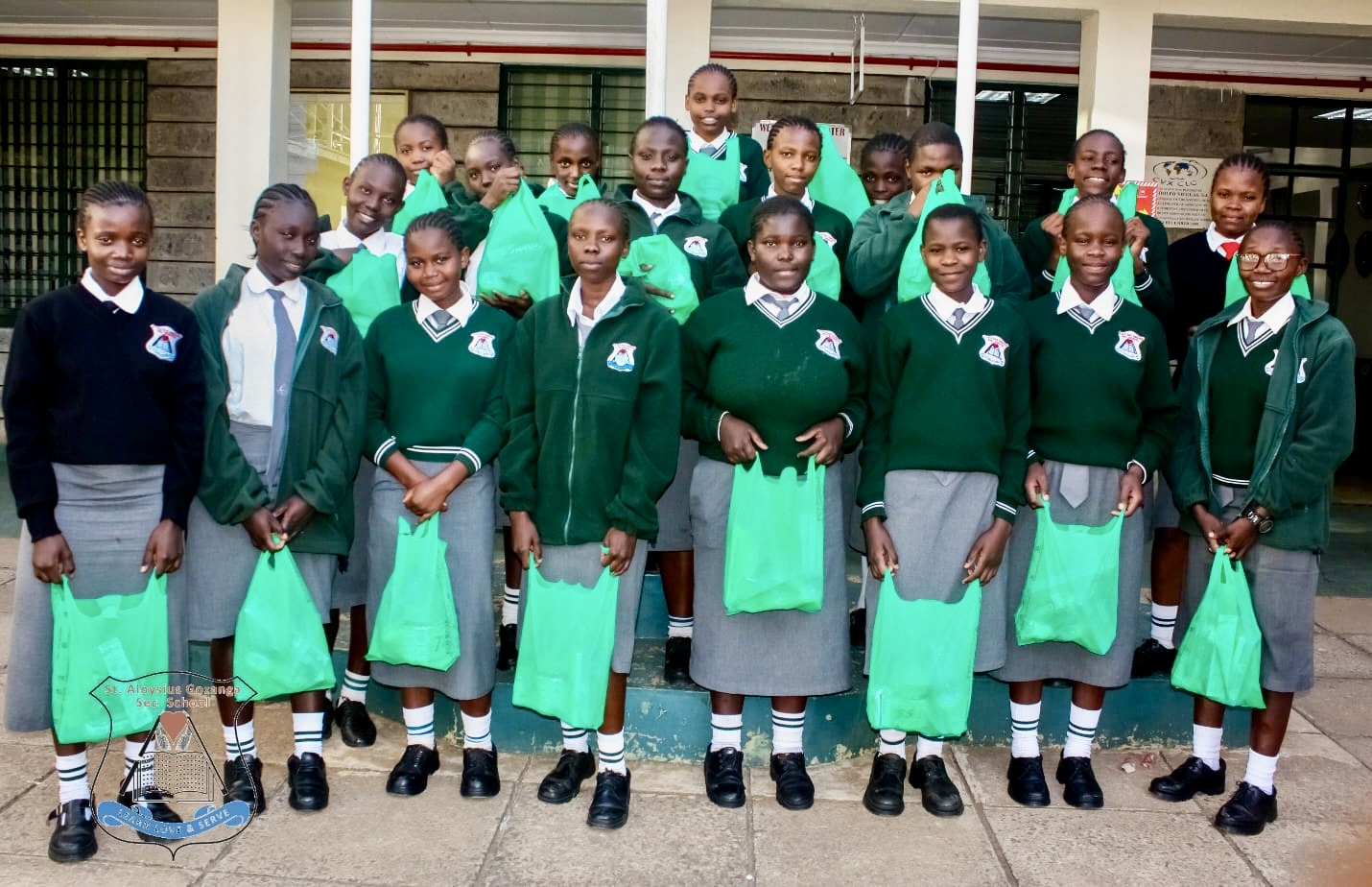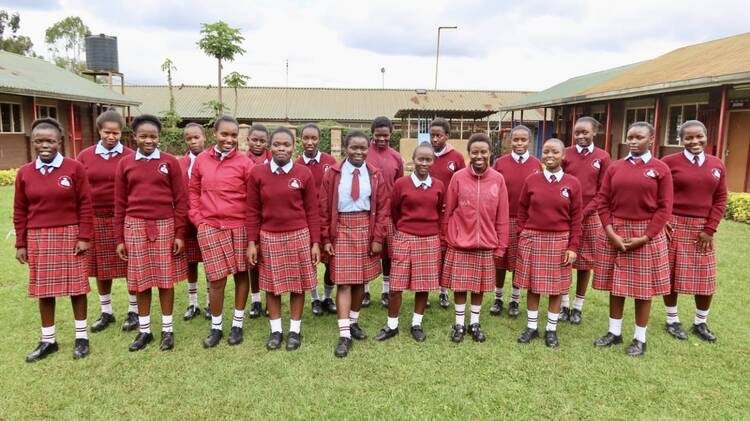Elizabeth Mbula speaks carefully and deliberately over the Zoom video link. She is sitting in a dimly lit classroom in Machakos, Kenya, and her internet connection is not stable. But she is eager to speak in front of the room, lighting up in front of the camera.
Her braids drape over the shoulders of her orange school uniform as her school counselor, a sister of the Sacred Heart, looks on. “I could not pay attention in school because I was being beaten by my stepfather at home,” she explains. “He tried to rape me, but I escaped.”
Zinchia Adhuambo Norman, a 17-year-old Kenyan schoolgirl, shares a similar story. “I survived my father’s abuse for eight years,” she said.
“I was abused sexually by my father from eight to 13 years old. I thought every child goes through that. I believed this was a common experience for all children."
She describes her experience with a pragmatic, hard-earned authority. In her single-room home in Nairobi, there was no escape from her father. When her mother discovered the abuse, she blamed Zinchia.
“I had to turn to the sisters,” Zinchia said.
“I was abused sexually by my father from eight to 13 years old. I thought every child goes through that. I believed this was a common experience for all children,” said Brenda Karimi, another abuse survivor. “I couldn’t understand that this was a grave violation of my rights.” A few audience members solemnly shook their heads as tears pooled in the corners of their eyes.
Elizabeth, Zinchia and Brenda shared their stories at a side event during the United National General Assembly on Sept. 18 in New York, “Empowering the African Girl Child Through Transformative Education; Harnessing the Power of Catholic Education for Sustainable Change,” hosted by the Jesuit Justice and Ecology Network-Africa and the Bakhita Partnership for Education.
Tragically, the stories shared by these African girls are not unique. Globally, 15 million adolescent girls have endured forced sex at some point in their lives, according to a report by the U.N. Special Representative of the Secretary-General on Violence Against Children. In sub-Saharan Africa, it is estimated that only one in 10 girls who are assaulted will report their abuse; gender-based violence is often referred to as the “silent epidemic.”
Tragically, the stories shared by these African girls are not unique. Globally, 15 million adolescent girls have endured forced sex at some point in their lives.
Resources for these young women are limited; many girls depend upon other adult figures in their lives, like teachers, to escape abuse at home, but there is a shortage of educators trained to help these girls.
“The education system I was a part of failed to help me. I didn’t receive the support that I needed,” said Brenda. “The person who brought me to and from school was my father, the man who abused me.” Brenda began to fail classes and act violently toward other children.
Gender-based violence is not the only deterrent to school attendance for these girls. Poverty, child marriage, cultural norms and lack of sanitary care products for menstruating girls are all barriers for over nine million girls to access an adequate education in sub-Saharan Africa, according to a 2022 report from the U.N. Commission on the Status of Women. Without an education, these girls are unable to leave their homes. Tasked with household management—water collection, cooking, cleaning—many may face continued abuse.
In response to the diminishing enrollment of girls in school during the Covid-19 pandemic, the Jesuit Justice and Ecology Network-Africa launched the Bakhita Partnership for Education in October 2020 to reinforce girls’ right to education. The partnership, supported by religious sisters from a number of different orders, works directly with girls in sub-Saharan Africa.
Without an education, these girls are unable to leave their homes. Tasked with household management—water collection, cooking, cleaning—many may face continued abuse.
It offers training for religious sisters in what has been called gender-responsive education, an approach that considers the impact of cultural and societal norms that may inhibit learning and academic performance among female students. According to a toolkit for educators in Africa created by Unesco, gender-responsive education allows girls “to think and work collectively” in the classroom while having female educators guide them both academically and socially.

“Those are my girls,” said Rosemary Nyribume, S.H.S., the director of St. Monica’s Girls Tailoring Center in Gulu, Uganda. In her keynote address at this side event, held at Fordham University’s Law School, she cited the “millions of girls who are sexually abused,” highlighting especially the suffering endured by young girls who had been used as sex slaves after their abduction by the Lord’s Resistance Army, a Christian extremist group active in Northern Uganda.
Named one of Time magazine’s 100 Most Influential People in the World in 2014, Sister Nyribume has brought thousands of girls into her vocational school. It offers its female students not only a classroom education but also a marketable skill—tailoring. “We must work together to educate our girls and protect them and advocate for them,” Sister Nyribume told America.
But the gap between need and capacity continues to widen. “We’re doing good, but we are far from doing what we are supposed to do,” said Charlies Chilufya, S.J., director of the Jesuit Justice and Ecology Network–Africa. “Without adequate financing,” he said, “we will lose these girls and lose our communities”
“It is not enough to take a girl to a classroom and give her a desk and a teacher. Are they being transformed, helped to be better human beings...given more power to make their own decisions and...to direct their own lives?” Father Chilufya asked.
“We in the Catholic Church contribute anything between 40 to 60 percent of education services, depending on the country in Africa,” said Father Chilufya. He attributed the success of the gender-responsive approach to education to the religious sisters who “help the girls grow spiritually and mentally.”
“It is not enough to take a girl to a classroom and give her a desk and a teacher. Are they being transformed, given more power to make their own decisions and direct their own lives?”
“But much more needs to be done,” said Father Chilufya. According to Unesco, there are just under 20 million girls of primary-grade age in sub-Saharan Africa who are not attending school.
“This is a ticking time bomb,” said Yougbare Boubakar, a representative of the African Union International Center for Girls and Women’s Education, who urged “members of the private sector” to support efforts like the Bahkita Partnership. The need for curriculum reform, gender-responsive teacher training and financial sponsorship for girls in school is met with dwindling financial resources.
Amid calls to action, the young girls who represented some of the hundreds of beneficiaries of the partnership offered testimonies of hope. Zinchia recalled being able to take her secondary school exams with a calculator, a luxury she could not have imagined without the support of the partnership. After her graduation, Brenda has become an advocate of the partnership within the Bakhita community. She serves as a mentor for girls experiencing abuse and promotes girls’ education as essential not only to rebuild their self-worth but to enhance their economic potential.
Elizabeth could not participate in classes during the Covid-19 pandemic because of her abusive father and a lack of stable electricity in her home. But with the aid of the Bakhita Partnership, she enrolled in a Catholic school under the Catholic Diocese of Machakos. She called her classroom “a safe place and a home.”
Overcoming an education deficit for girls in Africa and around the world
The Bakhita Partnership, an intervention and teacher-training program that promotes “gender responsive” best practices for school girls in Africa, warns that young girls are especially at risk when they are kept from attending school.
“Being out of school doesn’t just have devastating consequences for girls’ life opportunities—it places them at risk of teen pregnancy, child marriage, female genital mutilation and other forms of gender-based violence,” the partnership says. Education, it continues, “gives girls the skills to become leaders, innovators and change makers, and to tackle future crises.” The out-of-school population in sub-Saharan Africa reached 98 million in 2021. The female out-of-school rate is 4.2 percentage points higher than the male rate.
244 million children and youth worldwide were out of school in 2021, including 67 million children of primary school age (6 to 11 years), 57 million adolescents of lower secondary school age (12 to 14 years) and 121 million youth of upper secondary school age (15 to 17 years).
9 million girls between the ages of about 6 and 11 in sub-Saharan Africa will never go to school at all, compared with six million boys.
15 million adolescent girls worldwide, aged 15 to 19 years, have experienced forced sex. Based on data from 30 countries, only 1% have ever sought professional help.
614 million women and girls lived in conflict zones in 2022—50% higher than the number in 2017—and 33% of all the children and youth unable to attend school in Africa live in a conflict zone.
380 million women and girls live amid high or critical water stress, a number projected to increase to 674 million by 2050 due to climate change.
Only 4% of total bilateral aid is allocated to gender equality and women’s empowerment. The additional investment needed for achieving gender equality by 2030, a U.N. Sustainable Development Goal, is estimated at $360 billion per year.
Sources: Unicef, the United Nations Children’s Fund; U.N. Women; World Bank








